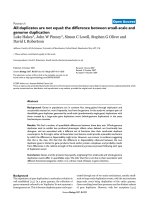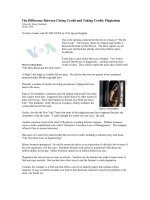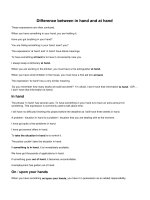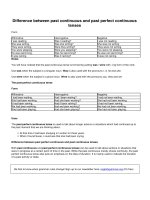Difference between past continuous and past perfect continuous tenses
Bạn đang xem bản rút gọn của tài liệu. Xem và tải ngay bản đầy đủ của tài liệu tại đây (10.12 KB, 1 trang )
Difference between past continuous and past perfect continuous
tenses
Form
Affirmative Interrogative Negative
I was reading. Was I reading? I was not reading.
She was writing. Was she writing? She was not writing.
They were writing. Were they writing? They were not writing.
You were sleeping. Were you sleeping? You were not sleeping.
He was swimming. Was he swimming? He was not swimming?
It was raining. Was it raining? It was not raining.
Notes
You will have noticed that the past continuous tense is formed by putting
was / were
with –ing form of the verb.
Use
was
when the subject is a singular noun.
Was
is also used with the pronouns I, it, he and she.
Use
were
when the subject is a plural noun.
Were
is also used with the pronouns you, they and we.
The past perfect continuous tense
Form
Affirmative Interrogative Negative
I had been waiting. Had I been waiting? I had not been waiting.
She had been working. Had she been working? She had not been working.
It had been raining. Had it been raining? It had not been raining.
We had been working. Had we been working? We had not been working.
She had been playing. Had she been playing? She had not been playing.
Uses
The
past perfect continuous tense
is used to talk about longer actions or situations which had continued up to
the past moment that we are thinking about.
At that time I had been studying in London for three years.
When I found Susie, I could see that she had been crying.
Difference between past perfect continuous and past continuous tenses
Both
past continuous
and
past perfect continuous tenses
can be used to talk about actions or situations that
were in progress at a certain point of time in the past. While the past continuous merely shows continuity, the past
perfect continuous tense also puts an emphasis on the idea of duration. It is mainly used to indicate the duration
of a past activity or state.
Be first to know when grammar rules change! Sign up to our newsletter here: englishgrammar.org (It's free)
Powered by TCPDF (www.tcpdf.org)









